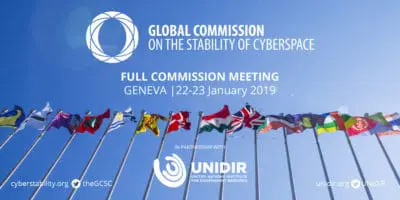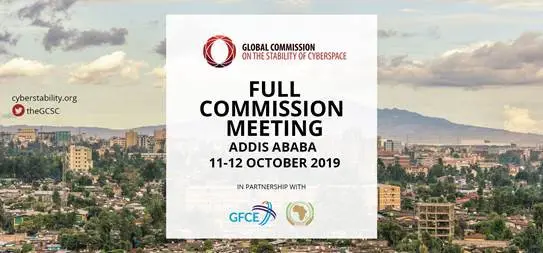The Global Commission on the Stability of Cyberspace (GCSC) conducted its fifth public hearings at the Palais Des Nations, United Nations Office in Geneva, on January 22, 2019. Hosted by the United Nations Institute for Disarmament Research (UNIDIR), the hearings featured discussions between members of the Global Commission, Geneva-based international organizations, government representatives, civil society and the private sector, and focused on how peace and security in cyberspace is influenced by international law, human rights, Internet governance, development, sustainable development goals and other issues.
“We greatly appreciate UNIDIR hosting the Commission and lending its expertise on the incredibly complicated topic of cyber stability,” said Marina Kaljurand, the GCSC’s Chair. “This meeting was emblematic of the multi-stakeholder nature of the issue and the range of actors required to address stability, security and continued confidence in the digital platforms on which we all depend.”
Renata Dwan, Director of UNIDIR said that “These Commission meetings were important because after being on the UN agenda for over two decades, we are now seeing an expansion on the discussion around what cyber-stability means and for whom. A debate that began focused on State behavior, is now becoming a much wider discussion about the role of the private sector, of regions and of individuals – and how to develop space for rights, for equity, and for access that enhances development for all.”
A keynote address was delivered by Fabrizio Hochschild, United Nations Assistant Secretary-General for Strategic Coordination, and remarks were also provided by Jon Fanzun, Special Envoy for Cyber Foreign and Security Policy, Federal Department of Foreign Affairs of Switzerland.
Over the course of the day, attendees participated in two hearings. The first focused on International Law, Peace and Security and Cyber Stability and featured the following speakers: Anja Kaspersen, Director, United Nations Office for Disarmament Affairs, Geneva Branch; Deborah Housen-Couriel, Senior Researcher, Interdisciplinary Cyber Research Center at Tel Aviv University; Helen Durham, Director of International Law and Policy, International Committee of the Red Cross.
The second hearing focused on the 2030 Agenda for Sustainable Development, human rights and Internet governance and included remarks by: Francesco Pisano, Director of the Library, United Nations Office at Geneva; Peggy Hicks, Director of the Thematic Engagement, Special Procedures and Right to Development Division, Office of the United Nations High Commissioner for Human Rights (OHCHR); and Elena Plexida, Senior Director Government and IGOs Engagement, ICANN.
In its closed session on January 23, the Commission continued discussions on the definition and principles for cyber stability, and recommendations for a future international peace and security framework for cyberspace. The input from the Hearings informed the Commissioners’ discussions. A definition of cyber stability and recommendations for the international community going forward will be central elements in the GCSC’s report.
The GCSC would like to thank the organizations that have submitted feedback in response to the Request for Consultation on the Singapore Norm Package. The received comments were collected and presented to the Commission in Geneva and will be considered in the writing of the GCSC Report.
The Hague Centre for Strategic Studies, the EastWest Institute, the Chairs and Commissioners would like to thank UNIDIR for hosting the GCSC in Geneva, as well as the GCSC partners, the governments of the Netherlands, Singapore and France, Microsoft, ISOC, Afilias, and the other funders for their support.
The GCSC will next convene in March 2019 in Japan on the margins of the ICANN64 meeting. In the run-up to this meeting, the GCSC continues to welcome input from other stakeholders on its work. Comments may be sent to info@cyberstabililty.org or cyber@hcss.nl.






